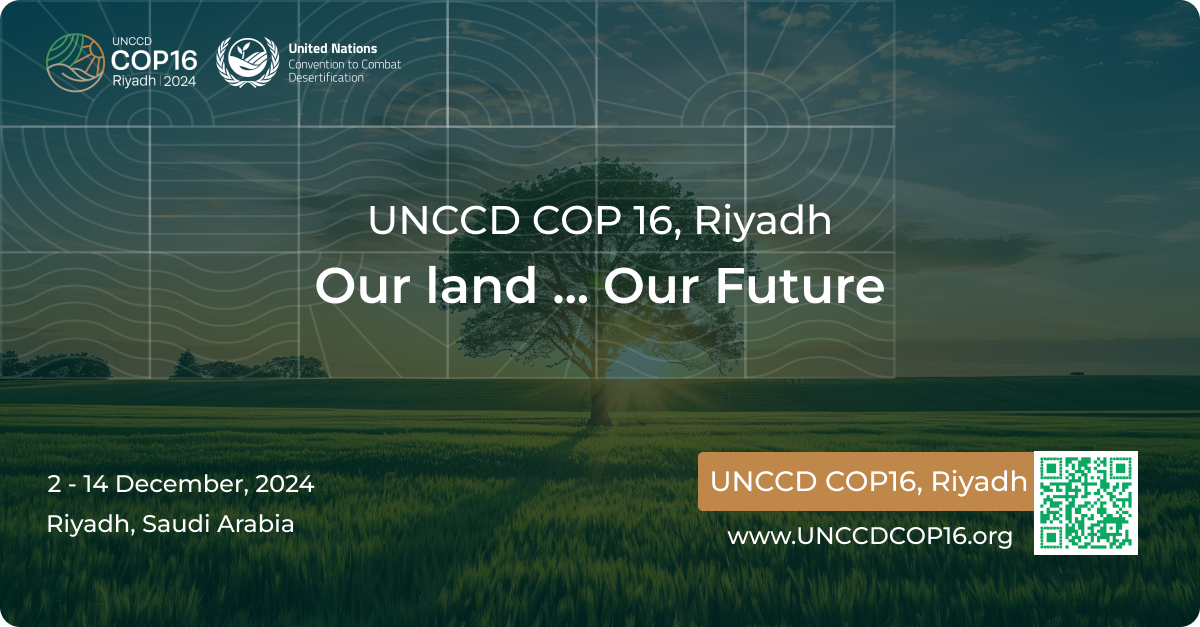الصفحة الرئيسية
<
Syndication
<
Saudi Arabia Calls for Urgent Global Action at COP16 as Land Degradation Reaches Crisis Levels
Saudi Arabia Calls for Urgent Global Action at COP16 as Land Degradation Reaches Crisis Levels
Hyphen Web Desk

Incoming COP16 President, Saudi Minister of Environment, Water, and Agriculture Abdulrahman AlFadley, emphasized during a preparatory “Road to Riyadh” event at the United Nations General Assembly in New York that the stakes are “unprecedented.” He urged the global community to recognize the “critical” state of land degradation, which not only threatens biodiversity but also exacerbates climate-related challenges such as food insecurity, forced migration, and economic instability. According to UNCCD data, droughts have increased 29% since 2000, and current trends suggest that as much as 75% of the world’s population could face drought-related impacts by 2050 if substantial action is not undertaken now.
Saudi Arabia’s vision for COP16, however, extends beyond policy statements, focusing on actionable steps and collaborative mechanisms. As part of its agenda, the Kingdom has designed an inclusive “Green Zone” at the COP16 venue to encourage partnerships between government bodies, civil society, and the private sector. Through this initiative, stakeholders are expected to share and advance innovative solutions, particularly those that support communities most vulnerable to the impacts of land degradation, such as smallholder farmers, women, and youth. This Green Zone, a first for the UNCCD COP conferences, underscores Saudi Arabia’s commitment to integrating diverse voices in addressing these challenges.
The conference will also spotlight Saudi-led environmental initiatives, including the Saudi Green Initiative, the Middle East Green Initiative, and the G20 Global Land Initiative. These programs aim to restore degraded land, reduce carbon emissions, and combat desertification across both Saudi Arabia and the broader Middle Eastern region. AlFadley highlighted that such regional efforts are instrumental in the global environmental fight, especially considering the unique environmental conditions of the Arabian Peninsula, which is highly susceptible to drought and desertification.
At the “Road to Riyadh” event, UNCCD Executive Secretary Ibrahim Thiaw echoed the urgency voiced by Saudi leaders, noting that effective land restoration could have “multiple benefits” not only for environmental sustainability but also for socioeconomic resilience. Thiaw urged that the world’s response at COP16 be characterized by heightened ambition, emphasizing the pressing need to recalibrate human interactions with the land in sustainable ways. Experts estimate that to meet Land Degradation Neutrality targets outlined within the UN’s Sustainable Development Goals (SDGs), approximately 1.5 billion hectares of degraded land would need restoration by 2030—a target that COP16 aims to address directly through strengthened commitments and global collaboration.
Beyond governmental partnerships, COP16 will prioritize the intersection of technological innovation and land restoration, particularly through climate-smart agriculture and data-driven resource management. Saudi Arabia is expected to launch initiatives aimed at improving the accuracy of land degradation assessments, utilizing satellite imaging and AI-powered environmental monitoring systems. These tools, Saudi officials argue, can help nations manage their natural resources more sustainably and predict environmental risks with greater precision.
The Kingdom’s hosting of COP16 reflects an evolving environmental policy trajectory, bolstered by both national and international initiatives to mitigate climate-related challenges. Under the Saudi Green Initiative alone, the country has set a target to plant 10 billion trees, with additional commitments to restore 40 million hectares of land. Meanwhile, Saudi Arabia has pledged to reduce its carbon emissions by over 278 million tons annually by 2030, a move seen as a model for climate action in arid regions globally.
As COP16 approaches, the momentum surrounding Saudi Arabia’s leadership role has sparked discussions on the potential legacy of the Riyadh summit. Environmental advocates hope that the conference will catalyze long-term commitments from developed and developing nations alike, aiming to reduce the vulnerabilities of populations affected by environmental degradation. Saudi officials have noted that a strong outcome at COP16 could mark a turning point in the global response to land degradation, with the potential to influence future UN environmental policy frameworks.
التسميات:
#Syndication
مشاركة:
